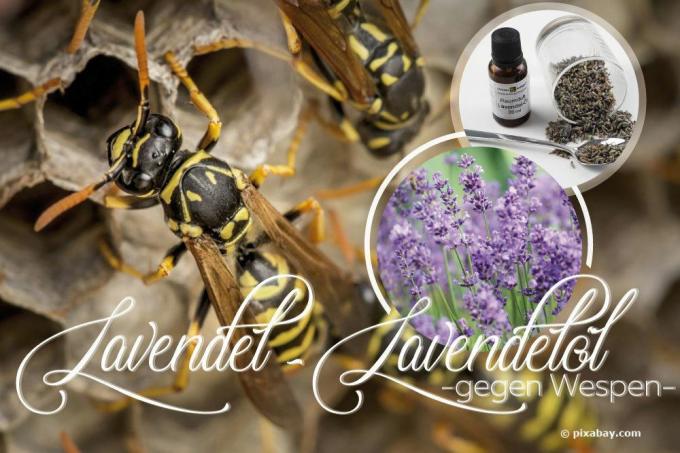
table of contents
- ingredients
- Animal sense of smell
- Herbal combinations
- Lavender plants
- Apply lavender oil
Wasps are typical guests in late summer. They are attracted to all kinds of food and come very close to people. The fear of a sting is always present and often combined with the desire to kill the insects and to clear their nests. When looking for a suitable home remedy for the winged animals, many people come across lavender. But does the popular plant help with the essential lavender oil?
ingredients
The question of whether lavender or its essential oil can drive away wasps must be clarified on the basis of the ingredients. Above all, the five species that are most commonly grown and offered should be mentioned here.
- Real lavender (bot. Lavandula angustifolia)
- Woolly lavender (bot. Lavandula lanata)
- Great Speik (bot. Lavandula latifolia)
- French lavender (bot. Lavandula dentata)
- Crested lavender (bot. Lavandula stoechas)

Just Lavandula angustifolia and Lavandula latifolia have the highest concentration of ingredients, which can be seen in the intense scent of the plants. For this reason, they are often offered as a scented herb that is perfect on the balcony or in the garden.
The ingredients at a glance:
1. Linalyl acetate
This substance is a monoterpenoid ester, more precisely a flavoring substance, which is one of the main components for the characteristic Scent of lavender is responsible. The liquid has no color, but a clearly audible smell that is sweet and fresh. It is immediately reminiscent of lavender, if not completely, as it is only part of the aroma. It is found in numerous other essential oils, such as bergamot oil, and is an important part of the perfume industry. It is not poisonous, so it is ideal for deterring wasps.
2. Linalool
Linalool is made from lavender as an alcohol, more precisely acyclic monoterpenes, which are also responsible for a certain aspect of the aroma. In contrast to the freshness of linalyl acetate, linalool has an extremely floral scent, which is also reflected in the Aroma of lavender. Like linalyl acetate, it occurs in other plants, but there increasingly in herbs such as coriander, black pepper and plants with a bitter taste such as nutmeg or hops. When it occurs as an ester, it is an important component of wines, especially the Muscat grape variety. However, the substance is responsible for possible allergic reactions.
3. Camphor
Camphor is understood to be a monoterpene ketone that is used in medicine, but has a psychedelic and even toxic effect in higher doses. The most famous plant that makes camphor is that Camphor tree (bot. Cinnamomum camphora). The concentration of camphor in lavender is not high enough to cause effects, but the strong odor means that wasps do not dare to go near the plant.
4. Cineole
These Flavorings are often associated with camphor and have a similar aroma. They also make it possible to use Lavandula as a medicinal plant, as it has a positive effect on the respiratory tract and nose. Even asthma and hay fever can be treated with cineole.
5. More fabrics
There are also other substances that are important Components of essential oils apply. Since the essential oil of lavender is what is supposed to work against the insects, the plant depends on these substances. They make up about 65 percent of the composition of the ingredients and are the basis for the effect of the plant and carrier for the substances mentioned above.
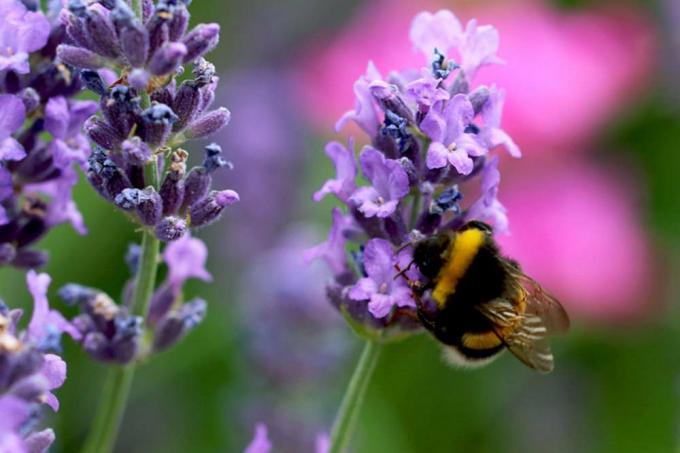
The important substances include:
- Terpenes: chemical compounds in the form of phytochemicals
- Oxides: Oxygen compounds in the form of acids
- Ester: chemical compounds that function as a flavoring agent
- Ketones: chemical compounds, also function as a flavoring agent
These substances are not poisonous for humans and insects, which makes it particularly gentle to use. They don't bother the animals with the smell, they just keep a distance from the plant. The higher the concentration of the carrier substances, the more intense the aroma can be, which of course has a good effect on the effect required for quenching.
Animal sense of smell
Based on these ingredients it can be determined that wasps avoid the plant, as the smell has an unpleasant effect on the animals' sensitive sense of smell. However, this is very much dependent on the individual species, because Lavandula angustifolia is almost twice as high in concentration as Lavandula dentata. You can use that to your advantage and mainly the Real lavender and Great Speik to have an effective remedy against wasps available. However, the plant alone is not always enough to drive away the insects. But there are numerous ways to use Lavandula taxa in such a way that the flying insects stay away.
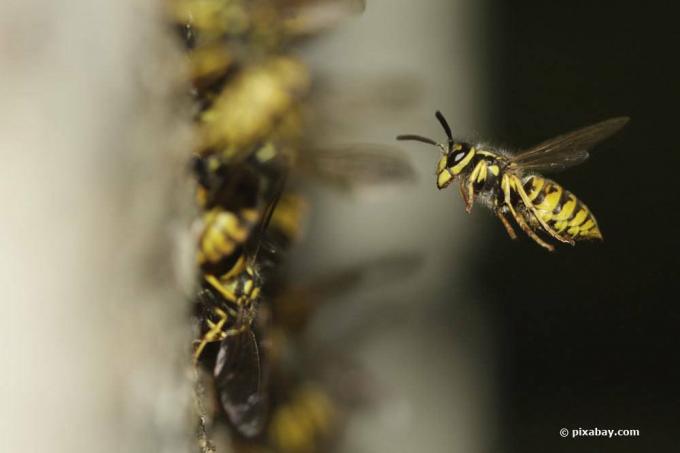
Herbal combinations
Lavandula and other herbs
One of the most common ways to keep wasps away is that combination various herbs and plants together with the lavender plants. Like bees, wasps avoid special plants whose smell they can't stand at all and which you can use to enhance the effects of lavender. The best thing: they are not exotic, but plants that can easily be kept in Germany over the summer.
- Rosemary (bot. Rosmarinus officinalis)
- Basil (bot. Ocimum)
- Tansy (bot. Tanacetum vulgare)
- Thyme (bot. Thymus)
- Peppermint (bot. Mentha piperita)
- Catnip (bot. Nepeta cataria)
- Anise (bot. Pimpinella anisum)
- Verbena (bot. Verbena officinalis)
Lavender plants
The trick is to use the lavender plants in large numbers along with the other plants. As a result, one is particularly pleasant and stimulating for people Scent in the air while the wasps stay away from it. The advantage of this is that you can increase the effect with each specimen, making it difficult for the insects to venture near you. In addition, the plants help to keep other annoying insects such as ticks or even mosquitoes away, which is especially pleasant over the summer. A Mediterranean garden is good for you if you want to experience your summer without flying insects.

Tip: Tansy was a repellent against wasps as early as the Middle Ages. At that time, shoots were cut from the plant and put in the nest, which drove the animals out of their own homes over the long term.
Apply lavender oil
Instead of the plant, you can easily use lavender oil to keep the insects out of your garden or your own four walls. Lavender oil is the concentrated, essential oil of the lavender plants and most often the flowers of Lavandula angustifolia utilized. When choosing an oil, you should definitely pay attention to the quality, because the higher the quality of the lavender oil, the more intense the aroma and thus the deterrent effect on insects.
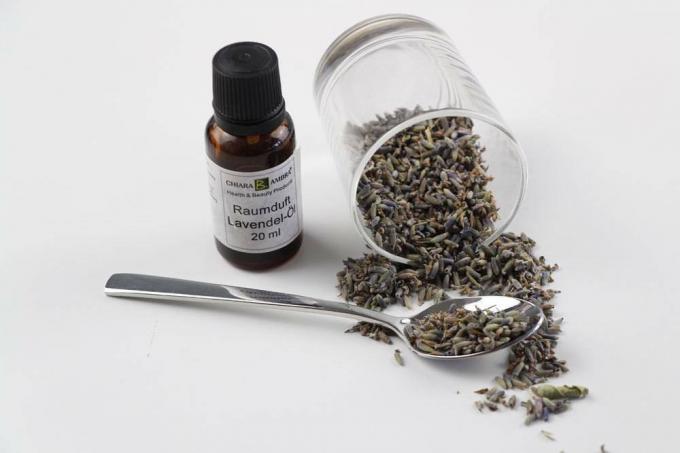
You can use the lavender oil in two ways:
1. Fragrance lamp
You can set up fragrance lamps at the desired location, fill them with oil and light them. That Lavender aroma spreads even faster with this variant and since wasps cannot stand smoke in any form, they keep a lot of distance. The aroma is even intensified via the fragrance lamp, which works particularly well as a deterrent. The only downside to this method is the need to keep topping up the fragrance oil. Therefore, it is particularly suitable for barbecues or a coffee with cake in the garden or on the terrace.
2. spray
With a lavender spray you can easily find corners in the garden and your `s Living spaces rid of wasps. Since this can be easily sprayed, it works within a few moments and can be refreshed again and again.
You prepare the spray in the following way:
- fill a measuring cup with clear water
- now add lavender oil; a few drops are enough
- you can also add other essential oils
- the mixture is now stirred so that the oils can be well distributed in the water
- then it is filled into a spray bottle
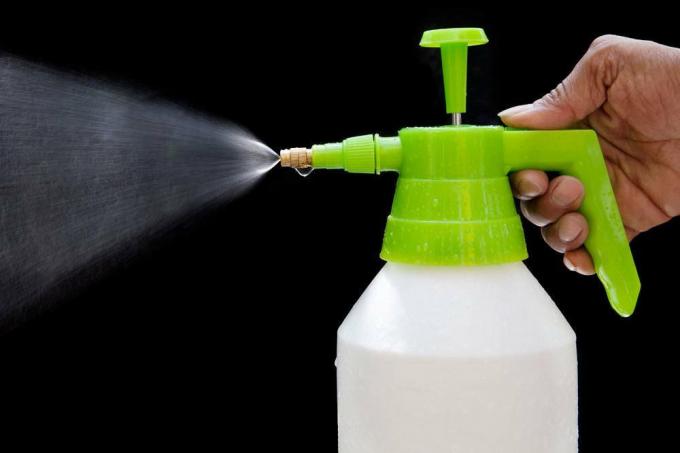
You can the mixture simply refill and use it throughout the summer without any problems. The spray will not harm your garden plants or other insects in any way if you only use essential oils. Even animals are not harmed by the spray, which enables use at any moment. Lavender oil is versatile and the higher the dosage, the more effective the effect.
Tip: If you accidentally get stung by a wasp, you can even apply the lavender oil to the sting and let it soak in. The active ingredients in the oil are absorbed by your skin, relieving the pain and itching of the bite.
